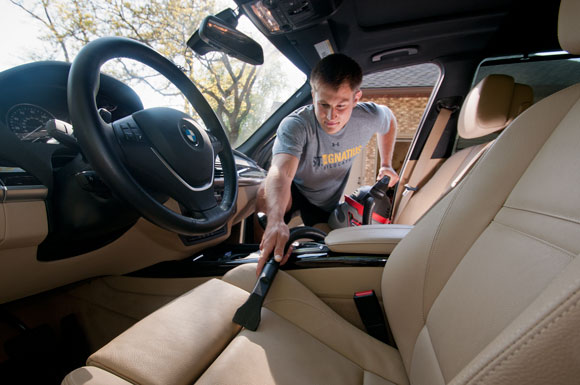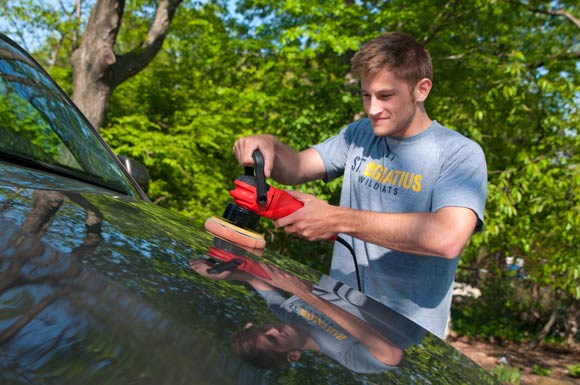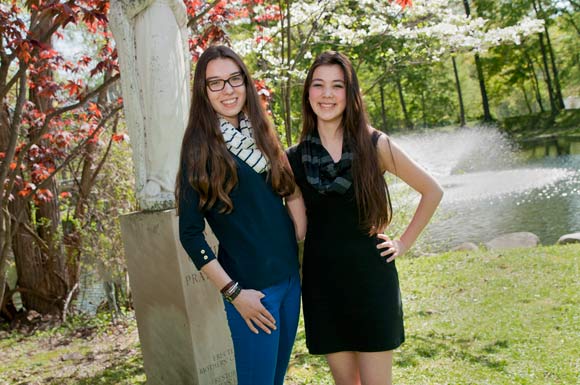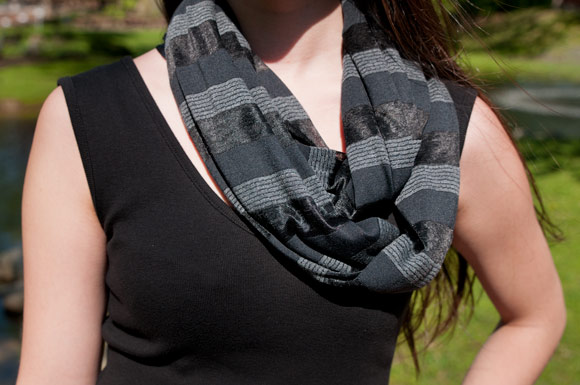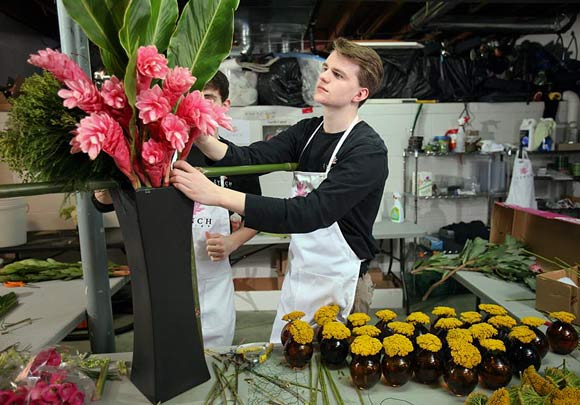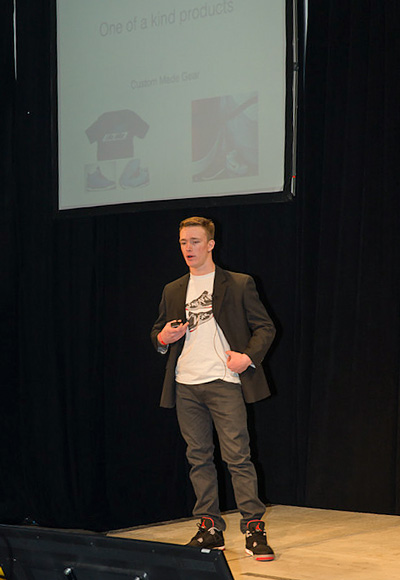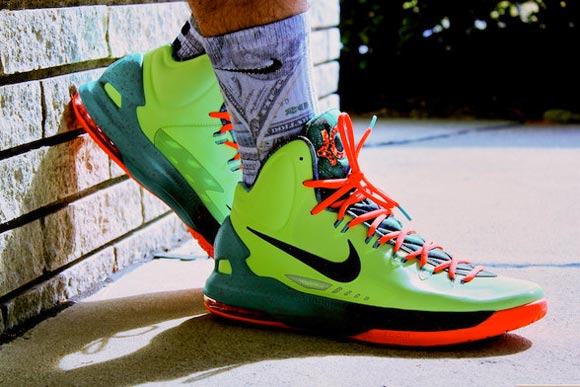early adopters: how teaching entrepreneurship at a tender age pays off down the road
Two summers ago, in 2012, St. Ignatius High School student Ryan Linker was looking for a way to earn some extra cash. So he decided to start his own car detailing business. “My parents were bugging me to get a job,” he recalls. “My dad suggested I start some sort of business. He did car detailing as a kid and knew it pretty well and he said he could teach me.”
The company took off, first with friends and neighbors, then quickly expanding by word of mouth thanks to the spectacular job he did on the interiors and exteriors of the cars he detailed.
“I’m very anal about everything,” Linker explains. “I will work on a car until every piece of dust is gone. Sometimes it takes eight hours.”
Following that first summer, Linker met with Saint Ignatius Entrepreneurial Academy (SIEntA) advisor Dan Hess, competed in the business plan competition and won $250. Linker used that money to buy a buffer (it does a better, easier job than hand waxing), and opened for business again in 2013. He raised prices a bit and hired a friend to help.
Linker’s experience running his own business is precisely why area schools are teaching entrepreneurship education to high school, middle school and even elementary school students. Aside from the extra cash, entrepreneurship teaches skills one can’t learn in a classroom, including self-confidence, customer service, time management, organization and creative thinking.
Entrepreneurship 101
Created through a three-year grant from the Veale Foundation of $10,000 a year, SIEntA is more than just a club. Hess teaches micro-economics, macro-economics and entrepreneurial studies. The students get paid summer internships, develop business plans for their own business ideas and put their ideas into action.
“We’re giving kids who have an inclination toward business an outlet,” explains Hess. “For kids to walk around campus thinking about business is great. You may not be an innovator, but you can still be an entrepreneur.”
The Veale Foundation invests in young entrepreneurs because their businesses and ideas are critical to the region’s future economy. “Northeast Ohio is a pretty robust entrepreneurial ecosystem,” says executive director Cynthia Bailie. “We find it’s important because we want to introduce kids to entrepreneurship while they are in high school. So when these kids go to college they’ll feel pretty confident to come back and use their networks to start and grow businesses.”
Other area organizations, such as University School’s Entrepreneur Institute and the Network for Teaching Entrepreneurship (NFTE) are doing similar programs in area schools.
The business experience students get from being a young entrepreneur is why the Veale Foundation and the Burton D. Morgan Foundation have funded programs like the Young Entrepreneur Market (YEM). The program gives middle and high school student entrepreneurs an opportunity to sell at the Shaker Square and Crocker Park North Union Farmers Markets.
The markets give the students real life experience in business. “So many students today are already involved in some sort of entrepreneurial class,” says YEM director Reka Barabas. “The market takes it from paper to implementation. You can see how their behavior changes, standing there for four hours talking to customers face-to-face. At first they are shy and not proactive. Time passes and they gain more confidence and reach out to customers.”
Michelle Park, 18, a senior at Beaumont School, and her partner Carolyn Dryer, 16, a sophomore, founded Aquila by Design, which sells fashion scarves made from fabric scraps. Park and Dryer wrote their business plan in Beaumont’s microeconomics class last school year before launching earlier this year. “We wanted to make it fun,” explains Dryer of their concept. “The important thing in business is to do something you love.”
The two sold their designs at the Shaker Square Farmer’s Market earlier this year. “Being able to sell at Shaker Square in April was amazing,” says Park. “We finally felt like our business plan on paper was turning into a reality. It was the first time that we were selling our product outside of school and we loved being able to directly interact with people and see their reactions to our products.”
Furthermore, Aquila by Design caught the eye of a buyer for JoAnn Fabrics, who after admiring the duo's work, arranged to donate fabric to the company in the future.
“The best part was making the business connection with JoAnn Fabrics,” says Park. “If our company hadn't been at the marketplace, we wouldn't have gotten the generous donation of fabric to help us further the beginning of our business.”
Designs by Aquila plans to expand into bowties -- for both men and dogs -- later this summer. Park plans to study fashion design and business at Kent State University in the fall.
Teach Entrepreneurship, Reduce Dropouts
Entrepreneurial education provides the building blocks for success in students’ careers as adults. Greg Malkin, who heads the Entrepreneur Institute, emphasizes the skills students learn from entrepreneurism, even at an early age.
“Ten years ago I used to get a blank stare when I talked about entrepreneur education,” says Malkin. “Now people are embracing it. Now the question would be, Why aren’t you teaching entrepreneurism? The growth of this country is almost synonymous with entrepreneurship and innovation.”
Malkin teaches entrepreneurship classes that bring a variety of valuable business skills -- from working in groups to personal finance -- into practice. The experience of creating and running a business effectively contributes to dropout prevention, Malkin says. “The entrepreneur slant really helps students see why math is important,” he explains. “It’s another way to keep students engaged in school.”
That engagement is exactly why organizations like the Burton D. Morgan Foundation support entrepreneurship education at all levels. “We support programs from grade school through college,” says Deborah Hoover, president and CEO. “For a lot of students, exploring entrepreneurship as a career option helps them envision the future. There are a lot of programs related to visualizing the future and seeing entrepreneurship as a viable career option.”
One way University School and Burton D. Morgan support young entrepreneurs is through Lemonade Day, a nationwide program that teaches entrepreneurial skills to kids through lemonade stands. The kids have to come up with a plan, go before a loan board for funding, purchase their ingredients and set their prices.
Think like an entrepreneur and you’re prepared for anything. That’s the approach Beachwood High School marketing and Junior Achievement teacher Greg Perry takes with his students. “Every student, no matter what field they go in to, they need to think like a business owner,” he says. “Entrepreneurial education is essential to all career fields.”
While not every one of Perry’s students will go on to be business owners, that way of thinking will give them a leg up in the business world. For instance, Perry cites Parker-Hannifin as one company that encourages all of its employees to think like entrepreneurs. Doing so, he notes, helps spur new ideas, solve problems and create ownership in the company.
Necessity, the Mother of Invention
Adam Moses, a Beachwood junior, is one of Perry’s students who took what he learned in class and turned it into a thriving custom athletic sock business, Moezaay. Moses starts with high-end basketball socks, and then puts custom designs on them to match the hottest styles of athletic shoes.
“It all started when I was young and I would go shopping for shoes with my mom and see all these people wearing really nice Nike and Jordan shoes,” recalls Moses. “My feet were growing fast and my mom would give me $50 for shoes, not enough for Jordan 11s, and I had no way to save up for them.”
Instead, Moses started crafting customized Nike Elite socks. He began selling them on eBay and found a receptive market. Now, business is thriving. “Before I started this I really wanted to be a doctor or possibly a lawyer," he says. "But after starting this I’m really good at what I do. It taught me what you can’t learn in a classroom.”
Moses has learned to work with different customers from all over the world – some great, some not so great. “I’m learning a little bit of everything,” he says. “I’ve learned a lot about how to deal with people. Every day I get a bunch of different customers.”
Troy Graf, a junior at St. Ignatius, also turned his love for upscale athletic footwear into a business. He recognized a market in accessorizing the expensive basketball shoes that are so popular among his peers. “I’ve always been into sneakers and shoes in general,” he admits. “Then I started to get into basketball shoes like Nike and Air Jordan and I realized the clothes and accessories on the market right now don’t do the sneakers justice.”
So Graf created Sneakerwear to honor the sneaker. “I created my own brand of clothing and accessories that caters specifically to sneakers,” he explains, and went after the “Sneakerheads, a subculture of sneaker collectors who stand in line all night for sneakers and spend several hundred dollars.”
The experience of running Sneakerwear has helped Graf find his calling. As long as brands like Adidas and Nike remain popular, he plans on building his company. Otherwise, he's considering buying a franchise company. “I’m looking at it as a basis for experience,” he says. “It’s a really great learning thing for me. I’m learning so much about marketing myself through business plan competitions, financing, learning the difference between an LLC and sole proprietorship.”
Graf is looking at a few different colleges, all of which have excellent business or entrepreneur programs. He plans to eventually earn his MBA.
Blending Passion with Interests at an Early Age
Other area students also are finding that their interests can be turned into lucrative businesses. Taylor Lovelace, a senior at Shaw High School, created Taylor’D Up Hats after taking Shaw career tech teacher Quelina Jordan’s E-CIty business class. Lovelace makes custom hats for companies and organizations for a reasonable price.
“You can have your logo on the front, back or side,” explains Lovelace. “You can have your name or any other thing you want. I use a manufacturer on Euclid Avenue and I take the hats directly to them so there are no extra costs.”
After working for a corporate bakery in a more traditional teenage job, Lovelace has found entrepreneurship suits him well. “I like being in charge,” he says. “I can control what I want to do, take it here, take it there. I work with my customers. We talk about what they want and I do it. No one pays until they are happy.” Lovelace plans to study business and graphic design in college, before going on to earn his MBA.
Jordan says the business classes at Shaw provide a good outlet for students to explore career options for after high school. “Not everyone fits the mold of a typical student,” she says. “We need something to bring out what they can do and this gives them another way to express what they can do. It’s a chance to blend their passions and interests at an early age.”
Will Lynch, a sophomore at University School, found his calling in floral design at a tender age. He owns Lynch Design, which creates high-end floral arrangements for events ranging in size from small get-togethers to large events and even weddings.
“I’ve always loved hotels and have had the pleasure of staying at nice hotels all over the world,” says Lynch, 16. “I associate hotels with flowers.” Lynch started his business in April 2012, and has established a solid reputation for creating beautiful arrangements.
Running Lynch Design also has helped Lynch come out of his shell. “I was very shy,” he admits. “With this I’ve had to make cold calls and talk to people. It’s an invaluable learning experience.”
While Lynch plans to go to college, he says he’s learning so much more about the business world by running his own company. “Whatever I do will be related somehow,” he says. “This definitely takes time away from school, but getting real life experience is worth it.”


